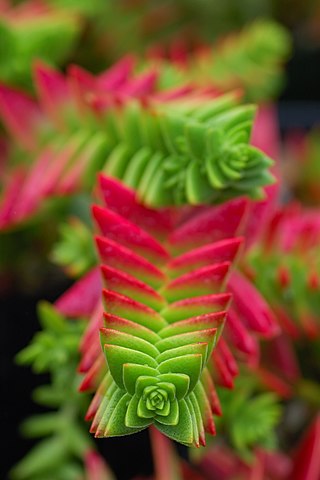
Crassula is a genus of succulent plants containing about 200 accepted species, including the popular jade plant. They are members of the stonecrop family (Crassulaceae) and are native to many parts of the globe, but cultivated varieties originate almost exclusively from species from the Eastern Cape of South Africa.
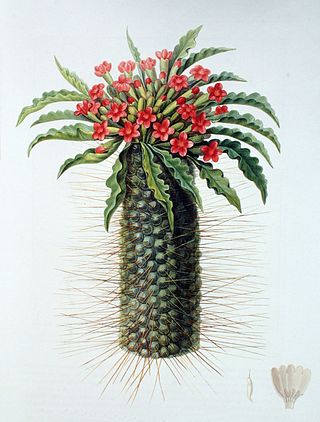
Pachypodium namaquanum, also known as halfmens or elephants trunk, is a Southern African succulent plant in the family Apocynaceae. The genus name Pachypodium is from the Greek for 'thick foot', an allusion to its swollen base, while the species name namaquanum is a reference to Namaqualand.

Crassula tetragona is a succulent plant native to Southern Africa. It is widely distributed from the Orange River boundary of Namaqualand to beyond the Kei River in the Eastern Cape. "Tetragona" comes from the phyllotaxy of the leaves. It is popularly named the "miniature pine tree" among ornamental plant enthusiasts, for its popular use as a "pine tree" in Bonsai.

Cotyledon tomentosa is a species of flowering plant in the family Crassulaceae, native to South Africa. It is a succulent evergreen shrub with large chunky ovate fuzzy green leaves. Its autonymous subspecies is known as the bear's paw because of the prominent "teeth" at the tips of its leaves. It forms large orange bell-shaped flowers in spring.
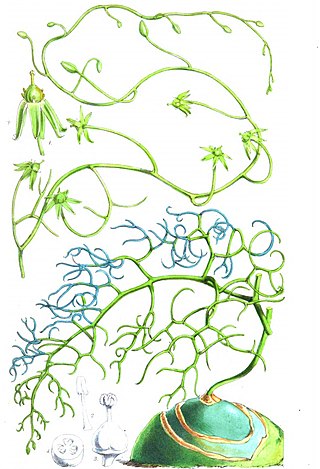
Bowiea, commonly known as climbing-onion, is a genus of bulbous, perennial, succulent plants which thrive in dry and desert regions of eastern and southern Africa, ranging from Uganda to South Africa. It is native to a region stretching from Kenya to Cape Province. It is the 14th most commonly sold medicinal plant in South Africa, used to treat various health conditions. Due to massive harvesting, populations of this plant have been significantly reduced. Because of its high content of potent cardiac glycosides, it is highly poisonous, and deaths of humans and other animals after ingestion are attributed to cardiac arrest. Due to its unique appearance, it is cultivated as a houseplant.

Crassula capitella, is a perennial succulent plant native to southern Africa.

Crassula nudicaulis is a succulent plant native to South Africa, and Lesotho.

Crassula deceptor is a succulent plant native to South Africa and Namibia. This species occurs from southern Namibia, to as far south as the town of Vanrhynsdorp in South Africa.

Crassula cotyledonis is a succulent plant endemic to the arid Namaqualand and Karoo regions of South Africa.

Crassula subaphylla is a succulent plant belonging to the family Crassulaceae. It is widespread in the Karoo regions of South Africa and Namibia.
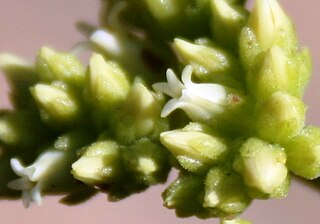
Crassula atropurpurea is a succulent plant, very common and widespread in the southern Karoo regions of South Africa and Namibia.
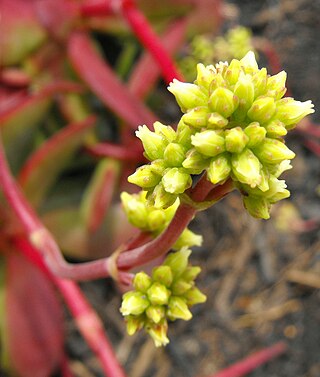
Crassula pubescens is a succulent plant, common and widespread in the southern Karoo regions of South Africa.

Crassula pellucida is a creeping, succulent ground-cover, or low-growing, spreading succulent shrub. It is native to eastern and southern Africa, ranging from Kenya and Angola to South Africa.
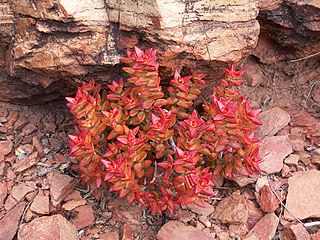
Crassula rupestris, called buttons on a string, is a species of Crassula native to Namibia and to the Cape Provinces of South Africa. It has gained the Royal Horticultural Society's Award of Garden Merit. It is also called bead vine, necklace vine, and rosary vine.

Tylecodon wallichii is a species of succulent plant in the genus Tylecodon belonging to the family Crassulaceae. The species is named in honour of Nathaniel Wallich, early 19th century Danish plant hunter, botanist and physician.

Crassula ericoides is a species of succulent plant in the genus Crassula native to South Africa. Growing in the fynbos ecosystem of South Africa, C. ericoides somewhat resembles a heather, growing into an upright shrub with bare lower stems and yellow flowers at the tips.
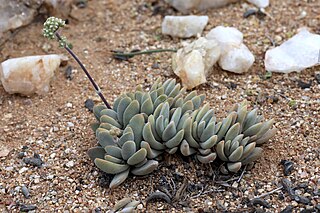
Crassula namaquensis is a species of succulent plant in the genus Crassula native to South Africa. Easily confused with some forms of Crassula tecta and Crassula sericea, this species has rounded to elongated leaves that are usually blue, covered in fine hairs, and form clumps.
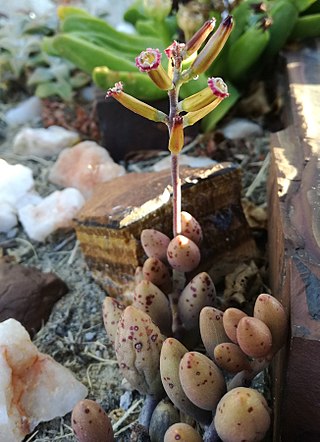
Adromischus filicaulis is a perennial, succulent plant in the family Crassulaceae. It is commonly called brosplakkies in Afrikaans. The species is endemic to South Africa and Namibia.

Crassula sarmentosa, commonly known as trailing jade plant and showy trailing jade, is a perennial succulent plant in the family Crassulaceae. It is native to southern Africa.



















